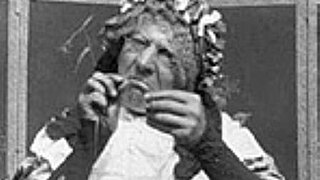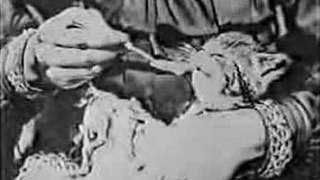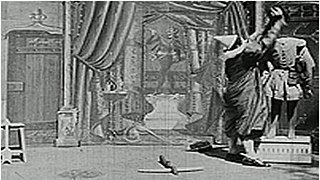Related Research Articles
Trevor Griffiths was an English dramatist.
Isadora Duncan, the Biggest Dancer in the World is a BBC Television film based on the life of the American dancer Isadora Duncan first broadcast on 22 September 1966. The film was directed and produced by Ken Russell and written by Sewell Stokes and Russell. It starred Vivian Pickles and Peter Bowles.

The Kiss in the Tunnel, also known as A Kiss in the Tunnel, is a 1899 British short silent, comedy film, produced and directed by George Albert Smith, showing a couple sharing a brief kiss as their train passes through a tunnel, which is said to mark the beginnings of narrative editing. The film is the first to feature Laura Bayley, Smith's wife.

Grandma Threading her Needle is a 1900 British short silent comedy film, directed by George Albert Smith, featuring an old woman trying to get a thread though a needle. The sole purpose of the 56-second single-shot film, like the director's earlier Old Man Drinking a Glass of Beer (1898), according to Michael Brooke of BFI Screenonline, "is to record changing facial expressions for the purposes of entertainment."

The Sick Kitten is a 1903 British short silent comedy film, directed by George Albert Smith, featuring two young children tending to a sick kitten.
Twelfth Night, or, What You Will is a videotaped 1988 television adaptation of Kenneth Branagh's stage production for the Renaissance Theatre Company of William Shakespeare's Twelfth Night first broadcast in the UK by Channel 4 on 30 December 1988. Made by Thames Television in collaboration with Renaissance, it stars Frances Barber as Viola and Richard Briers as Malvolio. The recording was shot on a single set with the appearance of a wintry garden. The costumes are Victorian, and the time of year is Christmas.

Spiders on a Web is a 1900 British short silent documentary film, directed by George Albert Smith, featuring a single shot close-up of two spiders trapped in an enclosure. The film is, according to Michael Brooke of BFI Screenonline, "less formally ambitious" than the director's "groundbreaking multiple close-up study Grandma's Reading Glass (1900), made the same year, but is nonetheless, "one of the earliest British examples of close-up natural history photography, predating Percy Smith's insect studies by a decade."

Let Me Dream Again is a 1900 British short silent drama film, directed by George Albert Smith, featuring a man dreaming about an attractive young woman and then waking up next to his wife. The film stars Smith's real wife, Laura Bayley, as the woman of his fantasies. Bayley would later appear in Smith's 1906 film Mary Jane's Mishap. The film, according to Michael Brooke of BFI Screenonline, "is an excellent example of an early two-shot film, and is particularly interesting for the way it attempts a primitive dissolve by letting the first shot slip out of focus before cutting to the second shot, which starts off out of focus and gradually sharpens." This appears to be the first use of a dissolve transition to signify a movement of a dreaming state to one of reality.

Walter Robert Booth was a British magician and early pioneer of British film. Collaborating with Robert W. Paul and then Charles Urban mostly on "trick" films, he pioneered techniques that led to what has been described as the first British animated film, The Hand of the Artist (1906). Booth is also notable for making the earliest film adaptation of A Christmas Carol with the silent film Scrooge, or, Marley's Ghost (1901).

Undressing Extraordinary is a 1901 British silent comic trick film directed by Walter R. Booth, featuring a tired traveller struggling to undress for bed. The film, "provides one of the earliest filmed examples of something that would become a staple of both visual comedy and Surrealist art: that of inanimate objects refusing to obey natural physical laws, usually to the detriment of the person encountering them," and according to Michael Brooke of BFI Screenonline, "has also been cited as a pioneering horror film," as, "the inability to complete an apparently simple task for reasons beyond one's control is one of the basic ingredients of a nightmare."

The Waif and the Wizard, also entitled The Home Made Happy, is a 1901 British silent comic trick film, directed by Walter R. Booth, featuring a magician using his magic to aid an ailing girl at the request of her brother. The film, "is rather less elaborate in terms of special effects than the other films that W.R. Booth and R.W. Paul made the same year," but according to Michael Brooke of BFI Screenonline, "provides an excellent illustration of how effects used sparingly can often have more impact, especially when set in a suitable emotional context."

Cheese Mites, or Lilliputians in a London Restaurant is a 1901 British short silent trick film, directed by Walter R. Booth. A gentleman is entertained by the little people who emerge from the cheese at his table.

The Haunted Curiosity Shop is a 1901 British silent horror trick film directed by Walter R. Booth, featuring an elderly curio dealer alarmed by various apparitions that appear in his shop.

The Extraordinary Waiter is a 1902 British silent comic trick film, directed by Walter R. Booth, featuring a brutish colonialist failing to destroy a blackfaced waiter. The film "makes for somewhat uncomfortable viewing," but according to Michael Brooke of BFI Screenonline, "it's just about possible to read this as a metaphor for the rather more widespread frustrations arising from British colonial rule, though it seems unlikely that this was intentional on Booth's part."
The Unfortunate Policeman is a 1905 British short silent comedy film, produced by Robert W. Paul, featuring a policeman chasing a young painter after he tips a pot of paint over him. The film is an, "elaborate chase comedy," which according to Michael Brooke of BFI Screenonline, "is an example of the increasing use of real locations in R.W. Paul's work." Film historian Ian Christie adds, "the irreverent and disrespectful treatment of the policeman would soon become impossible in British films, thanks to the notorious list of proscriptions laid down by the British Board of Film Censors shortly after its creation in 1912."

The Twins' Tea Party is an 1896 British short silent actuality film, produced and directed by Robert W. Paul. The film "was one of the very first 'facials'," which according to Michael Brooke of BFI Screenonline was "a popular genre in early British cinema that exploited what to 1896 audiences was the astonishing novelty of being able to see moving images of recognisable people in medium close-up as they reacted to a particular situation." John Barnes, author of The Beginnings of the Cinema in England, adds that "this charming one-shot film of two infant girls reluctantly sharing tea was one of the most popular items exhibited in R.W. Paul's programmes at the Alhambra Theatre in 1896."

Adventures of William Tell is an 1898 French silent trick film directed by Georges Méliès, featuring a clown trying to shoot fruit off the head of a dummy which comes to life. The film is "a knockabout farce based on jump-cuts and the timely substitution of dummies for real bodies," with, according to Michael Brooke of BFI Screenonline, "a level of onscreen violence not previously seen in a surviving Méliès film," which marks, "a bridge between the onstage effects of the famous Théâtre du Grand Guignol and countless later outpourings of comically extreme screen violence as seen in everything from Tex Avery cartoons to the early films of Sam Raimi."

Willie's Magic Wand is a 1907 British silent comic trick film, directed by Walter R. Booth, featuring a young boy terrorising the household with his father's magic wand.

Army Life; or, How Soldiers Are Made: Mounted Infantry is a 1900 British short black-and-white silent propaganda actuality film, directed by Robert W. Paul, featuring the King's Own Royal Lancaster Regiment riding over a plain. The film, which premiered on 18 September 1900 at the Alhambra Theatre in London, England, "is all that appears to remain of one of R.W. Paul's most ambitious projects," which, according to Micahael Brooke of BFI Screenonline, "had it survived in a more complete form," "would undoubtedly be considered one of the most important precursors of the modern documentary."
Ken Russell's ABC of British Music is a 1988 British documentary directed by and featuring Ken Russell. It was broadcast as an edition of The South Bank Show on 2 April 1988. The film presents an A to Z selection of Russell's musical enthusiasms, using alphabetical coincidence to present widely contrasting subjects - Elgar and Elton John, Holst and Heavy Metal, Punk and Purcell. Participants include Russell himself introducing each letter, along with soprano Rita Cullis, Thomas Dolby, Evelyn Glennie, Nigel Kennedy, John Lill, Julian Lloyd Webber, Eric Parkin and the saxophone quartet The Fairer Sax.
References
- ↑ Brooke, Michael. "Artistic Creation". BFI Screenonline Database. Retrieved 24 April 2011.